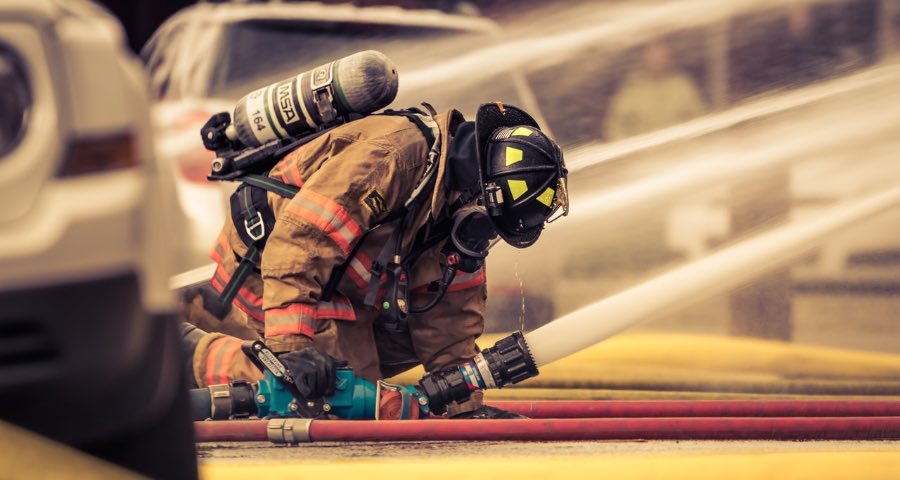Typically, reaching the point where one receives a diagnosis for substance use disorder usually means the individual has lost some or all functioning in life as a result of the disorder. While this remains true for most with substance use disorder, first responders and veterans have the added stress of post-traumatic stress disorder as well as trauma-related triggers that led to using alcohol or drugs as coping mechanisms. As a fire fighter, paramedic, police officer or soldier, arriving first on the scene of a crime, accident, or other emergency can mean mere seconds to make life or death decisions. This level of stress releases not only hormones into the body but sends signals of distress to the brain which the brain then tries to solve. It is not uncommon for individuals to seek comfort in drugs and alcohol from this stress and trauma, but it can negatively impact job and day-to-day functioning.
First responders report several factors that contribute to their substance use disorder. For many the culture of the various organizations – police, fire, military – can be one of intense competition and dominance. More men than women have these occupations and therefore men’s risk for PTSD and substance use disorder is much higher.
Here are the specific statistics for some first responders and substance use disorder:
First Responders: Police With Addictions
Daily interaction with violence, death, and hostile situations are things every police officer faces daily. It is no wonder that high rates of substance use disorder present widely within this community. According to one study, “substance abuse among police officers is around 20-30%. By comparison, the prevalence of drug use disorders and alcohol dependence for the general population of adults in the United States is estimated to be 9.9% and 5.8% respectively.”[1]
This means that addiction is two to three times higher for police than the average adult population in the United States.
Veterans and Addiction Help
Living in a war-zone can be one of the most traumatic experiences a human can endure, then add other stressors such as the fear of being caught by an enemy, or not making it back home, and the experience can seem insurmountable. It is the leading factor in what causes many military veterans to return traumatized and addicted.
According to SAMHSA, “The most common primary substance of abuse among veteran admissions was alcohol (65.4%), followed by heroin (10.7%) and cocaine (6.2%). Veteran admissions were more likely than nonveteran admissions to report alcohol as their primary substance of abuse (65.4 vs. 37.4%) and were less likely to report marijuana (5.5 vs. 13.4%) or heroin (10.7 vs. 20.9%) as the primary substance of abuse.”
Military veterans face a challenge when it comes to recovery because generally they have co-morbid (co-existing) diagnoses like PTSD, depression, anxiety, insomnia and more. However, if put with a group of peers, general positive outcomes increase.
Fire Fighters and Substance Use Disorder
Fire fighters are tasked with running in to burning buildings while normal instinct is to run out of them. While this life-saving risk is a heroic act of bravery, the repeated trauma of witnessing loss, injury and death causes fire fighters to similarly seek comfort in substances. Fire fighters either in an urban or forested area endure extreme physical conditions that exacerbate the disorder as well.
A study conducted in the United States of 112 firefighters found, “Overall, many firefighters reported sleep deprivation (59%), binge drinking behavior (58%), poor mental well-being (21%), current nicotine use (20%), hazardous drinking behavior (14%), depression (11%), poor physical well-being (8%), caffeine overuse (5%), or poor social bonding (4%).”
Additionally, according to another study by SAMHSA, “In a study about suicidality, firefighters were reported to have higher attempt and ideation rates than the general population.”
Paramedics and Emergency Medical Technicians
Especially during COVID-19 we are acutely aware of the challenges paramedics, EMTs, emergency room doctors and nurses and others in the first-line healthcare setting face. Dealing with patients who are combative, mentally ill, suffering from a psychotic break, to losing patients, witnessing acts of extreme violence as well as occupational challenges such as long hours and disconnection from loved ones can all result in substance use disorder for these men and women.
In front line healthcare workers and first responders, one study showed that alcohol use increased incrementally for the first 8 days after an incident and didn’t return to normal for another 8 months.
How to Treat Functioning Addicts and Alcoholics
At its core, substance use disorder is categorized as highly functional in these situations since the people involved are gainfully employed and contributing members of society. Some of the criteria on what makes an alcoholic or addict may not apply here. Additionally, treatment for substance use disorder in first responders and veterans is tailored to their specific needs, as well. Peer support groups and treatment specifically geared toward trauma-related incidents, in a gender-specific program can help increase comfort levels and understanding in a safe environment. Options for inpatient or outpatient treatment are available to address the
First Steps Recovery can help you or your loved one Take the First Step toward a lifetime of joy and freedom. Please call us at 844.BIGSTEP.
If you aren’t sure if they’re ready for rehabilitation, read more in our blog entitled, “5 Signs You Are Ready for Rehab”.
Sources:
[1] https://heinonline.org/HOL/LandingPage?handle=hein.journals/ajpol7&div=5&id=&page=, https://jamanetwork.com/journals/jamapsychiatry/fullarticle/2470680, https://www.niaaa.nih.gov/publications/brochures-and-fact-sheets/alcohol-facts-and-statistics, https://www.banyantreatmentcenter.com/2020/06/01/cops-and-alcoholism/







